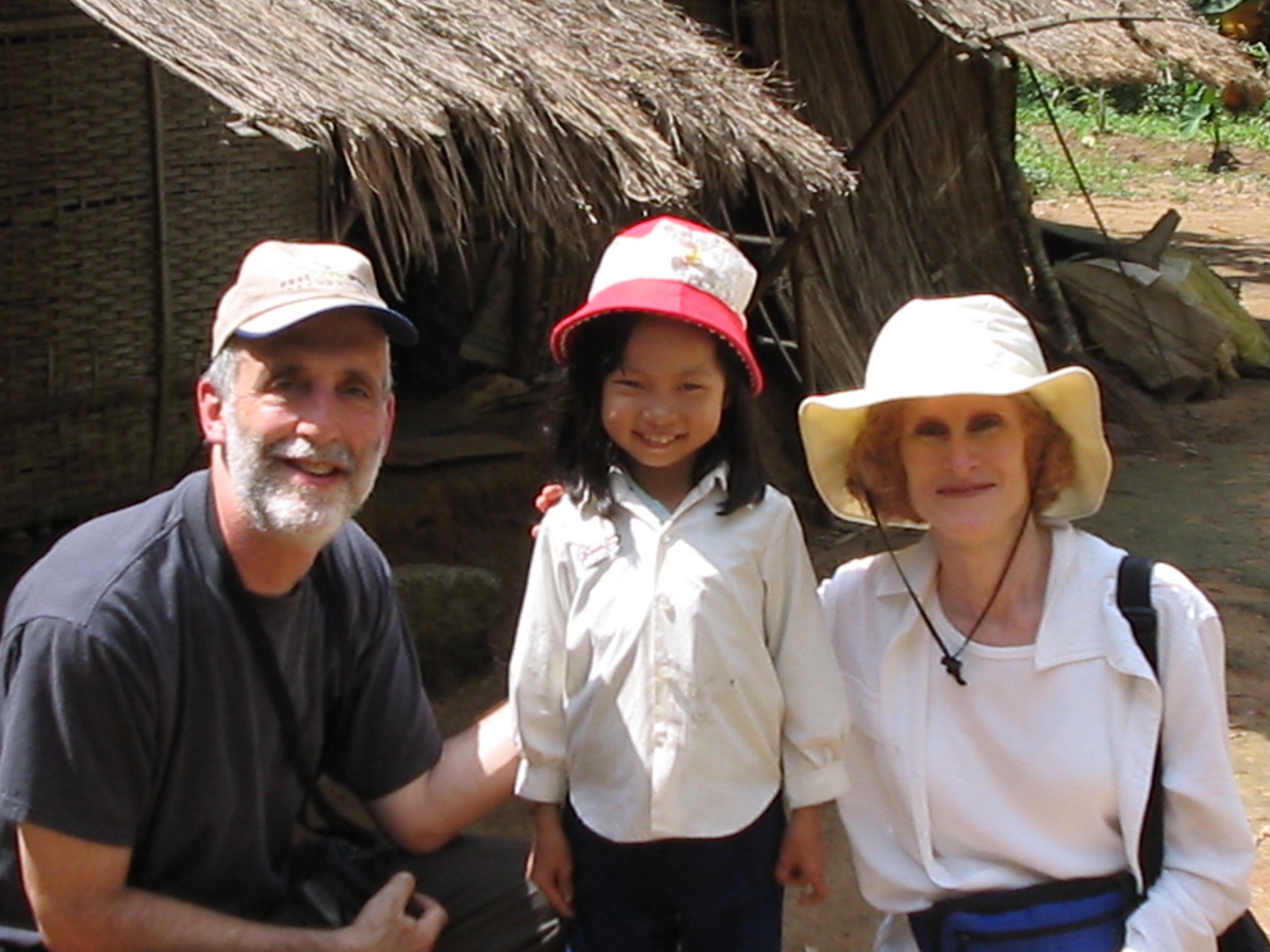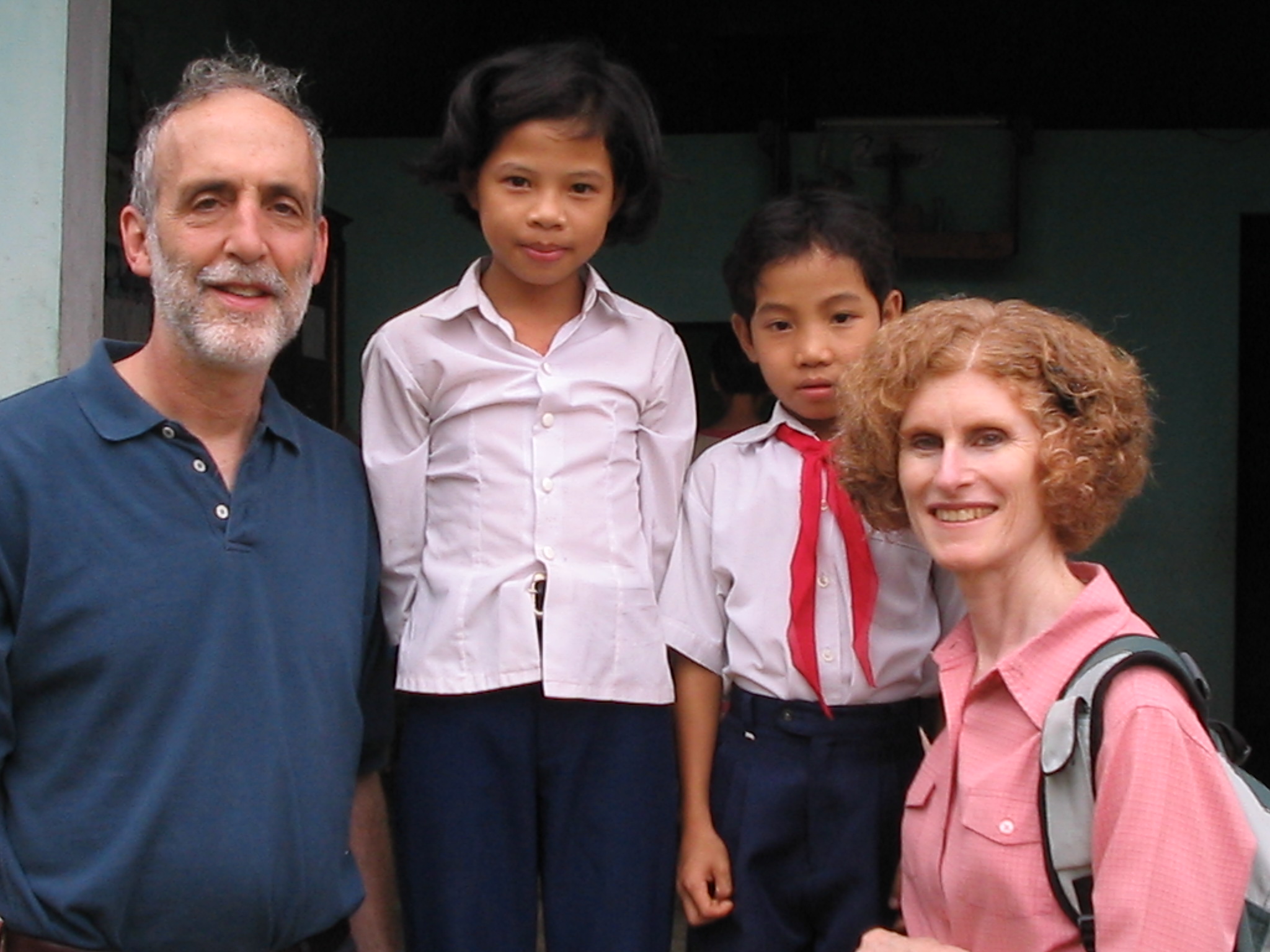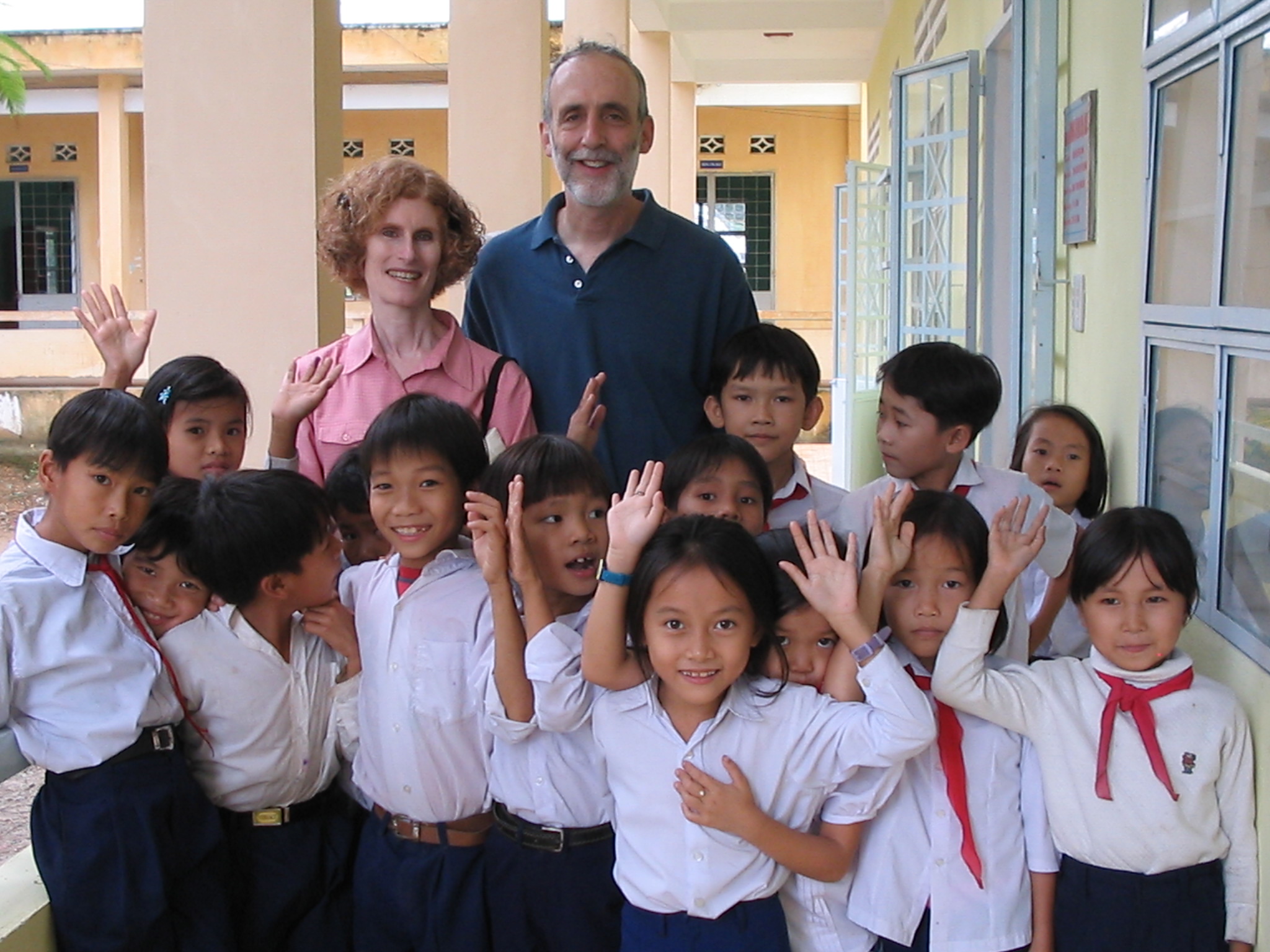Scarsdale Residents Improve the Lives of Thousands of Children in Vietnam
- Tuesday, 28 October 2014 11:50
- Last Updated: Tuesday, 28 October 2014 12:10
- Published: Tuesday, 28 October 2014 11:50
- Joanne Wallenstein
- Hits: 19568
 A Backroads Walking Tour of Vietnam in 2003 evolved into the adventure of a lifetime for Scarsdale residents Eric Hemel and Barbara Morgen. The trip was the couple's first foray into Asia and while touring rural areas of the country they found that many children were not in school. But rather than just noting the hardship and moving on, Morgen and Hemel found a way to address the issue and have spent the last 10 years sending thousands of children to school. Their inspiring story demonstrates how individuals can be effective at solving what sometimes appear to be insurmountable global issues that leave most of us shrugging our shoulders and feeling powerless.
A Backroads Walking Tour of Vietnam in 2003 evolved into the adventure of a lifetime for Scarsdale residents Eric Hemel and Barbara Morgen. The trip was the couple's first foray into Asia and while touring rural areas of the country they found that many children were not in school. But rather than just noting the hardship and moving on, Morgen and Hemel found a way to address the issue and have spent the last 10 years sending thousands of children to school. Their inspiring story demonstrates how individuals can be effective at solving what sometimes appear to be insurmountable global issues that leave most of us shrugging our shoulders and feeling powerless.
Hemel had a distinguished career in finance before conceiving the Scholarship Program to Enhance Literacy and Learning (SPELL), which provides scholarships to impoverished Vietnamese students to send them through school. Before leaving Wall Street, Hemel was President of Alson Capital, a New York City based investment partnership. Prior to that, Hemel was Co-Head of U.S. equity research at Merrill Lynch, , an equity analyst at First Boston, Morgan Stanley and Merrill Lynch for 13 years, and was ranked in the annual Institutional Investor poll in the Financials and REIT categories for 12 consecutive years, nine as #1 in his sector. Before coming to New York , he held several positions in the Reagan Administration, including serving as staff director of the President's Council of Economic Advisers. Eric graduated from Stanford University, where he earned his B.A., MBA, and Ph.D.
His wife Barbara Morgen is an attorney who worked for most of 25 years in the for-profit sector as a futures and derivatives lawyer. In 2004 she joined the Court Appointed Special Advocates (CASA) program in Westchester, which is under the umbrella of the Mental Health Association of Westchester. As a staff supervisor, she trains and supervises volunteers. "CASA's" are trained volunteers, who are appointed by Family Court judges to advocate for children who are in foster care, or at risk of placement in foster care, as a result of abuse or neglect. CASA volunteers report to the Court on the child's status, with particular emphasis on a child's health, developmental and educational needs. Morgen is a graduate of Brown University and University of California at Hastings Law School.
The couple moved to Scarsdale in 1986 and have lived in the same house ever since. According to Hemel, "The best thing about it, in addition to friends, was that it was a wonderful place to raise our two children--Daniel and Deborah. The schools were great as per the conventional wisdom. But, in addition, we also found Edgewood to be the perfect "Leave it to Beaver" neighborhood where both the elementary school and parents promulgated and reinforced great values."
Here's the story, in Hemel's own words of his evolution from Scarsdale financier to philanthropist and agent of change:
"Barbara and I were guests on the first Backroads Vietnam Walking Trip in the fall of  2003. It was our first visit to Vietnam and for all practical purposes our first visit to Asia. Our close friends, Barbara Guss and Gil Kemp, joined us on this trip and have been partners in this odyssey ever since. We went as tourists, with no other agenda in mind. But in the course of our trip, during which we walked through a number of rural villages, it came to our attention that in least in some of the poorer provinces a considerable number of school age children were not attending school for economic reasons. It was unclear to us at the time why, exactly, this was the case. But, regardless, we viewed it as tragic that children were not receiving the benefits of a full primary education when their lives could be so greatly enhanced by even a few years of additional schooling.
2003. It was our first visit to Vietnam and for all practical purposes our first visit to Asia. Our close friends, Barbara Guss and Gil Kemp, joined us on this trip and have been partners in this odyssey ever since. We went as tourists, with no other agenda in mind. But in the course of our trip, during which we walked through a number of rural villages, it came to our attention that in least in some of the poorer provinces a considerable number of school age children were not attending school for economic reasons. It was unclear to us at the time why, exactly, this was the case. But, regardless, we viewed it as tragic that children were not receiving the benefits of a full primary education when their lives could be so greatly enhanced by even a few years of additional schooling.
After returning to the U.S., my wife and I engaged in considerable research to determine the nature of the problem and what we could do about it. Up until that point we had never engaged in any meaningful humanitarian efforts, so this was all new to us.
We confirmed that despite its Communist form of government, a child's going to "public" school in Vietnam costs his or her family approximately $50 per year, enough to deter the very poorest kids from receiving much more than a fifth grade education ($50 is a lot in a country where the poverty line is defined as income below $120 per capita annually). The challenge for us, at that point, was to find a way to channel funds so that they reached the intended recipients with as little bureaucratic red tape and administrative costs as possible. Based on previous professional experiences, we were distrustful of large development agencies with large institutionalized bureaucracies. We were looking for an organization that was innovative, flexible, able to grow rapidly if funds were available, and close to the grassroots. We wanted to have enough ongoing involvement so as to ensure that our funds were reaching the designated beneficiaries. And we also wanted to monitor the situation on an ongoing basis so as to ensure that once a child began receiving our assistance this arrangement could continue in subsequent years.
 After numerous conference calls, e-mails back and forth, and some face to face meetings with different non-governmental organizations with some presence (or at least interest) in Vietnam, we narrowed down our list of prospective operating partners. Then, in March 2004, Barbara and I spent close to a month in Vietnam with five different organizations who either had-or wanted to have--scholarship programs aimed at keeping very poor children in elementary and secondary school. We spent most days visiting schools and/or spending time in very poor villages and urban areas. But we also spent time assessing each organization's capabilities within Vietnam. Both Barbara and I spent many years on Wall Street, she as an attorney and me as an equity analyst, and we insisted on performing our own due diligence in assessing an organization's strengths and weaknesses.
After numerous conference calls, e-mails back and forth, and some face to face meetings with different non-governmental organizations with some presence (or at least interest) in Vietnam, we narrowed down our list of prospective operating partners. Then, in March 2004, Barbara and I spent close to a month in Vietnam with five different organizations who either had-or wanted to have--scholarship programs aimed at keeping very poor children in elementary and secondary school. We spent most days visiting schools and/or spending time in very poor villages and urban areas. But we also spent time assessing each organization's capabilities within Vietnam. Both Barbara and I spent many years on Wall Street, she as an attorney and me as an equity analyst, and we insisted on performing our own due diligence in assessing an organization's strengths and weaknesses.
We decided to launch our program through the East Meets West Foundation (now renamed Thrive Networks) which was the largest American non-profit in Vietnam. The program, the Scholarship Program to Enhance Literacy and Learning (SPELL) began in September 2004 with 1,500 enrollees, all in the third, fourth, and fifth grades. In addition to our own financial contribution, funding for this program was provided by the generosity of Barbara Guss and Gil Kemp, and a few other Scarsdale couples and other close friends who took the leap with us, and who have remained as committed donors. The program has expanded, and now approximately 6,000 kids have benefited from the program (in addition, another 7,000 students have gone through a high school program which EMW developed and administered, based on our SPELL experience, but which was funded entirely by the World Bank).
The program is fairly comprehensive for our students. In addition to providing school fees and "income-in-kind" to the students (books, book bags, notebooks, school uniforms, bicycles for the children who live long distances from schools), we also provide, most importantly, extensive after-school tutoring and, in some cases, room and board. The program is also complicated, at least financially, by our pledge (and the pledges of other donors) to continue to pay for the children's school and tutoring expenses through the end of 12th grade so long as they are promoted from one grade to the next (despite the fact that the exact level of future expenses, per student, is impossible to estimate precisely). The initial selection of children is based solely on poverty criteria, not academic performance (although there are some exceptional kids in the program). Subsequently, Gil Kemp and Barbara Guss, with our participation, started the "SPELL Goes to College" component of the program which now provides college scholarship to close to 200 students, most of whom started with us in elementary school.
I am involved directly in all of the major policy decisions and changes regarding the program. I came back from my 25th trip to Vietnam in March, during which I visited students and their parents at 55 schools. My wife Barbara has joined me on many of these trips. Each of our trips involves several weeks of fieldwork, on both SPELL and several other programs we are involved in as donors and/or program initiators. The SPELL related portion of these trips including visiting numerous scholarship families and meeting officials and teachers at some of the 100-plus schools where the program has operated . We rely, day to day, on seven full-time EMW staff members who work exclusively on the program, as well as a far-flung network of Vietnamese retired teachers who volunteer their time to administer the program in their particular locales. The opportunity to transform thousands of lives with a relatively small expenditure has proven both exciting and gratifying. My work is augmented by my having joined the Board of Directors at East Meets West shortly after the scholarship program began. Gil Kemp, who had been a financial partner in this venture from the beginning, joined the Board of EMW in 2009 and now joins me on many of my trips to Vietnam.
There are three important "life lessons that we have gleaned from our experience.
First, traveling to far away places can change both your perspective and your role in the world in unexpected ways. Getting away from crowded tourist spots provides insights that would not be remotely achievable otherwise.
Second, as you are probably aware, U.S. dollars have a whole different meaning in places like Vietnam. Our finding that $50 (in 2004) could secure a child a year in school is just one example.
The third lesson is that involvement in developing country philanthropy can entail more than just writing a check. As I have conveyed, Barbara and I have been involved in every key policy decision regarding our scholarship program.
On a different front, I have been heavily involved, since its inception, in funding and designing EMW's Breath of Life program where $2,000 pays for a neonatal device, CPAPs (continuous positive airway pressure machine - -used over 30 years ago in U.S. hospitals) which can, over the course of several years, save as many as a dozen moderately premature infants from death or brain damage (we have deployed several hundred of these machines over the last five years, hopefully and probably saving at least several thousand lives). A portion of my trips to Vietnam have included visiting provincial and district hospitals in order to assess what we were doing right-and wrong-in our choice of sites for this program; we have several prominent American neonatologists who were actively involved in the program from its inception, and accompanied me on many of my hospital visits. I have actually now visited hospitals in 59 out of Vietnam's 64 provinces (by contrast, the SPELL program is concentrated in seven provinces). The Breath of Life program has now expanded to another dozen or so countries; I have been active in laying the groundwork for our efforts in Myanmar, which I have visited for each of the last three years, also visiting hospitals all over the country. Gil and Barbara gave their full endorsement to this project as well, initially as financial partners. More recently, Gil has joined me on some of the Breath of Life fact finding trips.
In regards to this last point, our experiences need not be unique. East Meets West (now Thrive Networks) very much wants "engaged donors", with the knowledge that philanthropy coupled with direct involvement will entail a stronger commitment on the part of the contributors, as well as greater program accountability and effectiveness."
Hemel did note that today the economics of sending a child to school have changed. Ten years ago it cost $50 per year to keep a third, fourth or fifth grader in school. But now, inflation and more important, the aging of the kids, has definitely changed the numerical picture. A majority of their students are now in high school, where costs can range from $75 to $1,000, depending on the students' family circumstances and their own academic interests and potential. The college program, largely made up of SPELL high school graduates who started with the program in elementary school, costs $1,000 per student per year.
Learn more about their work and find out how you can get involved. Click here for a description of the scholarship program and click here for further information of the neonatal program.






